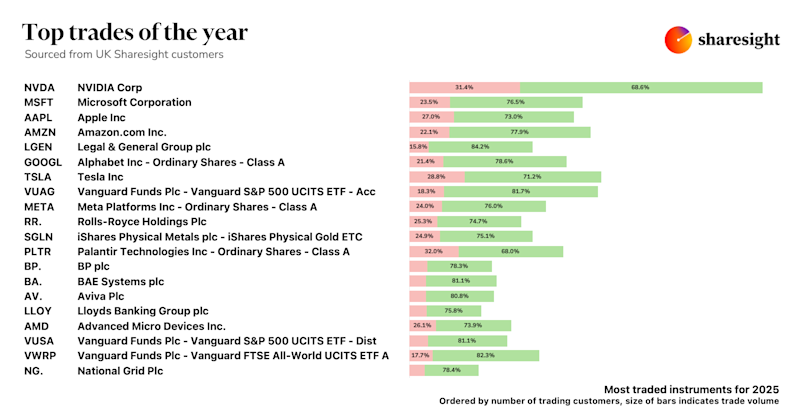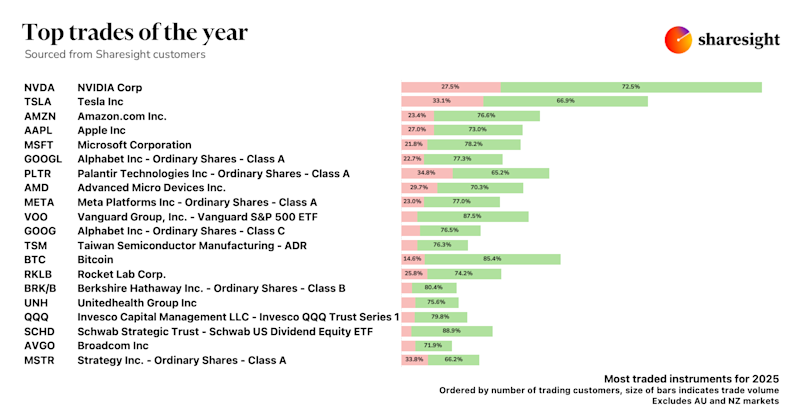Should you invest in early-stage companies or VC funds?
The below article is for informational purposes only and does not constitute a product recommendation, or taxation or financial advice and should not be relied upon as such. Please check with your adviser or accountant to obtain the correct tax treatment for your situation.
Last week, we joined forces with our office mates at LegalVision to co-host an event about how to get started in early-stage and venture capital (VC) investing. The event kicked off with traditional startup delicacies (pizza and beer), and was followed by Sharesight CEO Doug Morris moderating a panel of experts from the angel investing, VC and crowd-funding platform industries.

The panel
Tip Piumsomboon is an analyst at Blackbird Ventures. Tip also founded Young Women in Finance, a movement to strengthen the pipeline of women in leadership positions with over 800 members, and was named 100 Women of Influence and Smart Company's 30 Under 30.
Erez Rachamim is the Head of Fundraising at Equitise, an equity crowd-funding platform. His background is prominently in Venture Capital and Private Equity where he has invested in several SME enterprises and maintained hands-on involvement to help them grow.
Alan Jones is a founding investor in Australian tech startup venture funds Pollenizer, Startmate and Blackbird Ventures. Alan is currently raising a new venture fund, M8 Ventures. Alan is an active angel investor in both Australia and the US.
Andrew Bird is the Director of Waimarie, a private investment firm with a focus on private equity and early stage investments in technology and information businesses. A hands-on angel investor, his focus is mostly on SaaS businesses in the financial and legal-tech industries, including Sharesight, LegalVision, and TimeBase.
 From left to right: Tip Piumsomboon, Andrew Bird, Erez Rachamim, Alan Jones, Doug Morris
From left to right: Tip Piumsomboon, Andrew Bird, Erez Rachamim, Alan Jones, Doug Morris
The takeaways
There were many great insights shared by the panelists. Here are a few that really stood-out:
Passion vs. real knowledge
There’s a big difference between being interested in a certain company or industry, and really understanding how it works, and how to invest in it. Make sure you do your research before jumping in.
Software is king
The panelists all prefer to invest in software companies. Mainly because software is cost-effective to produce, there are no geographic boundaries or shipping costs, and you can “go live” in the click of a mouse.
Unsexy is sexy
Andrew doesn’t necessarily invest in “sexy” companies (although we’d argue that Sharesight is pretty hot!). Rather, he likes to invest in companies that people and businesses need, and that have high subscription renewal rates.
Consider a crowd-funding platform
Erez explained how crowd-funding platforms such as Equitise are democratising the investing landscape. They provide greater access for everyday investors, and could also be a stepping stone for those investors to move into angel and VC investing later on. While some minimums start at $100k, others are only $100, so it can be a good way for investors to get into early-stage investing without taking on too much risk.
Investing is like drinking: it's best not done alone. -- Andrew
Start small
Alan shared that angel investing in Australia typically starts at $10-$150k. So before jumping in as a full angel investor, Andrew likes to dip his toes in the water by starting with a 3-5 year horizon debt investment. This allows him to “de-risk” his involvement early on as it doesn’t rely on the company selling or listing publicly in order for him to see a return on his investment.
VC funds have data and networks
Alan said that he’s learned a lot by being an LP (limited partner) in a VC fund (he's invested in Blackbird). As Tip explained, the benefit of VC funds is that they’re able to connect early-stage company founders with founders who are just a few steps ahead of them. In Blackbird's case, they're also able to leverage 7+ years of data to analyse patterns and trends -- for example identifying what successful companies did in their early days -- and sharing those learnings with new participants.
Angel, VC and crowd-funded investing are not mutually exclusive
Erez made the point that you can approach early-stage investing from multiple angles, for example, by being an angel investor in one company, joining a VC fund, and using a crowd-funding platform like Equitise for other opportunities.
Join the board
Andrew recommends joining the board of the company you’re investing in. It will provide you with a better understanding of what’s going on and you can see exactly what they’re doing with your money.
Being useful is what we are here to be. -- Alan
Join an investor group
Investor groups can be a great way to learn about potential opportunities and meet fellow investors. Alan and Andrew both mentioned having made good contacts at angel investing group such as Sydney Angels.
Find an investing buddy
Andrew referenced the age-old advice that “investing is like drinking: it's best not done alone.” He's made it a rule to not invest until he can find someone else to invest along with him. It allows him to bounce ideas off the other investor and serves as “a good sanity test” to ensure he's on the right track.
Diversify your investments
Angel investing makes up about 25% of Andrew's total portfolio. Ensuring that the rest of his portfolio is well-diversified allows him to do what he’s interested in on the angel side, while providing him with the peace of mind of knowing that all his eggs aren't in one basket.
Be useful
Alan made the point that angel investing is not just about your financial returns, but about being able to share your experiences, because “being useful is what we are here to be.”

The Q&A session
The panel discussion was followed by a question and answer session. Here were some of the highlights (paraphrased):
How do you value a pre-revenue company?
Tip: We don’t ask them for their valuation. We ask them how much they’re looking for and what they’re going to use the money for (hiring, marketing, etc.). And we try to ensure that owners keep 60% for future raises, etc.
Alan: Accelerator programs can help provide a valuation (if the company survives and makes it through).
What are the tax implications of angel investing?
Andrew: There are schemes that help with early-stage investing within Australia, but I haven’t leveraged them myself. Overall, I’m not too concerned about it. As they say, “you're not going to go broke making a profit”. But try to do it within a tax savings vehicle (such as an SMSF) if possible.
What do you look for when investing in a company?
Tip: Are the founders doing their life's work, would they be doing it anyway? And is there already a lot of “customer love” for the product?
Andrew: Look for a good founding team. I'd pick the techie over the marketing guy if I had to choose.
Erez: Look at the founders’ backgrounds. We once invested $7m round just off a pitch deck because of the team, product, traction, and market potential.
Alan: Look for a leader that you can lead around the iceberg -- not one who's convinced he can make it through.
What are your favourite books or podcasts about VC / angel investing?
BOOKS
- Creativity, Inc. -- Erez
- Predictably Irrational -- Alan
- The Hard Thing About Hard Things -- Alan
- Unicorn Tears -- Alan
- Zero to One -- Alan
- Anything by Warren Buffet -- Andrew
- All the classic investing books still apply -- Andrew
PODCASTS
- Invest Like the Best, specifically the interviews with Josh Wolfe: episode 76 and episode 130 -- Tip
- Innovation Bay -- Alan
- The Failure Proof Podcast -- Alan
- The Twenty Minute VC -- Alan
Thanks to everyone who participated in, and attended the event. We look forward to hosting more in the very near future, so stay tuned to our Facebook and Twitter feeds for more info!
FURTHER READING

Sharesight users' top trades – December 2025
Welcome to the December 2025 edition of Sharesight’s monthly trading snapshot, where we look at the top buy and sell trades by Sharesight users over the month.

Top trades by UK Sharesight users in 2025
Welcome to the 2025 edition of our UK trading snapshot, where dive into this year’s top trades by the Sharesight userbase.

Top trades by global Sharesight users in 2025
Welcome to the 2025 edition of our global trading snapshot, where we dive into this year’s top trades by Sharesight users around the world.